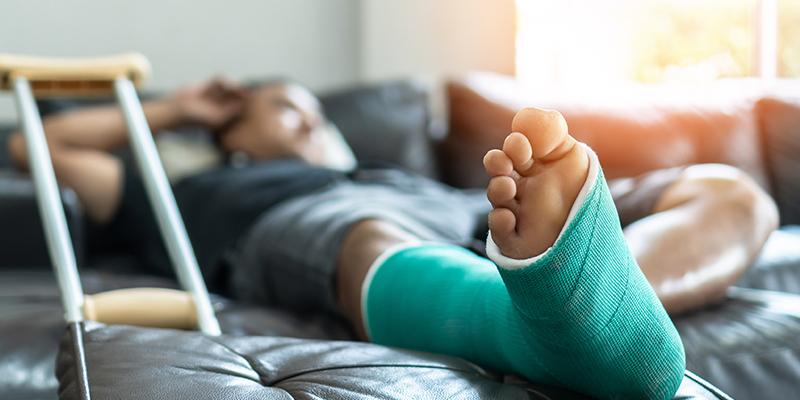Unfortunately, accidents happen. We’ve put together some important information to help you better understand your options if you’re ever faced with an accident or medical emergency.
The first step in any accident or emergency
Make sure everyone is safe and out of harm’s way. If it’s a medical emergency, call 000 for emergency and ambulance assistance. Medibank offers unlimited emergency ambulance on all hospital covers*.
If you’re unsure whether to go to an emergency department, please call 24/7 Medibank Nurse Support on 1800 644 325 to chat online at no extra cost.~ They can provide guidance on the appropriate next steps to take.


Your options in a medical emergency
Whether by ambulance or your own transport, an emergency department will most likely be the first place to go. Most major public hospitals in Australia have 24-hour emergency departments to deal with serious, urgent and life-threatening issues. Some of the larger private hospitals may also provide emergency departments.
When you do have a choice between a public or private emergency department, here are a few things to keep in mind:
Public hospitals tend to have larger emergency departments to deal with more serious accidents and emergencies. If it’s serious enough to need an ambulance, you will most likely be taken to a public hospital. If you are eligible for Medicare there are generally no costs involved.
In many cases, a private hospital emergency department may be quieter, and you may not have to wait as long. However, going to a private emergency department may result in out-of-pocket costs.
It’s important to remember that if you’re treated in the private emergency department (a plaster cast for a fracture, for example) and can leave without being admitted for further treatment, you won’t be able to claim on your private health insurance.
However, if you’re treated in a private emergency department and are then admitted to the hospital for treatment for injuries sustained in an accident^ then Medibank would pay benefits towards this admission. Read more about inpatient and outpatient treatment, and what your cover can pay benefits towards.
Also, keep in mind that some private hospitals charge an emergency department facility fee. Because this is generally a fee that the hospital charges an outpatient, it isn’t usually covered by private health hospital insurance. Some Extras covers may include a benefit towards private hospital accident and emergency facility fees. Check your Cover Summary to see if your cover includes this.
Your hospital options after an accident or emergency
Generally, if you go to an emergency department and need to be admitted instantly, you will just be treated at that hospital and won’t be given a choice of where to go. If it’s a private hospital, you’ll be a private patient in a private hospital; if it’s a public hospital, you’ll have the choice to be a private or public patient in a public hospital. Here’s what each of these scenarios mean.
Public patient in a public hospital: there are generally no out-of-pocket costs involved since public hospital treatment is paid for by Medicare, Australia’s public health system. You don’t have a choice over who treats you, are subject to public hospital waiting lists, and are less likely to get a private room.
It’s common for public hospitals to ask you to declare your private health insurance, but you are not obligated to use your private health insurance if you don’t want to.
Private patient in a public hospital: The treatment would generally be the same as what you would receive as a public patient. This option may also involve some out of-pocket costs. If you’re considering this option, it’s important to ask your hospital about any out-of-pocket costs you may incur.
Private patient in a private hospital: You’ll have more choice over the specialist or surgeon who treats you but may have some out of pockets like an excess. The hospital will check that your cover includes the services you need before you’re admitted. Your doctors will also need to complete a Medibank Accident Claim Form. We recommend you call us on 132 331 or chat to us online any time of the day or night so we can help you through the admission process.
Your options if you need follow up surgery or other treatment after an accident or emergency
Once your condition is stable and it’s safe for you to go home, you may still be referred to a specialist for follow-up treatment or surgery – for instance, if you need corrective surgery after a broken bone. In this situation your options include:
Having surgery as a public patient in a public hospital: There are generally no out-of-pocket costs involved since public hospital treatment is paid for by Medicare, Australia’s public health system. You don’t have a choice over who treats you, are subject to public hospital waiting lists, and are less likely to get a private room.
It’s common for public hospitals to ask you to declare your private health insurance, but you are not obligated to use your private health insurance if you don’t want to.
Having surgery as a private patient in a public hospital: The treatment would generally be the same as what you would receive as a public patient. This option may also involve some out of-pocket costs. If you’re considering this option, it’s important to ask your hospital about any out-of-pocket costs you may incur.
Having surgery as a private patient in the private hospital: You’ll have more choice over the specialist or surgeon who treats you but may have some out of pockets like an excess. The hospital will check that your cover includes the services you need before you’re admitted. Find out more about how to reduce your out-of-pocket costs.
Do you have Accident Cover Boost?
Should you be in an accident, most Medibank hospital covers come with Accident Cover Boost, also known as Accidental Injury Benefit^. With Accident Cover Boost you can rest assured that in the event of an accident you'll receive the benefits of our gold level hospital cover.
For example, if you need orthopaedic surgery because of an accident, you may be able to claim benefits for the surgery even if the ‘Bone, joint and muscle’ category isn’t included in your hospital cover. Check with us to find out if you’re eligible.
Please note if the treatment is resulting from your Accident, your doctors will also need to complete a Medibank Accident Claim Form. We recommend you call Medibank on 132 331 or chat to us online any time of the day or night so we can help you through the admission process.
Find out more about Accident Cover Boost here.


Looking for something else?
Visit our Hospital Assist homepage for a range of tools and advice to help you at every stage of your hospital journey.
Help the way you want it
Contact us
Call us on 134 190 to speak to a consultant. Alternatively, chat to us 24/7 online.
Self-service options
Login to MyMedibank or Download the MyMedibank App for self service options.
Find a specialist
Find a specialist or Member's choice hospital using our find a provider tool.

Things you need to know
* Waiting periods apply. For ambulance attendance or transportation to a hospital where immediate medical attention is required and your condition is such that you couldn't be transported any other way. TAS and QLD have State schemes that provide ambulance services for residents of those States.
^ For Accidents that occur in Australia after your cover starts. Must seek medical treatment within 7 days, and receive hospital treatment within 12 months, of the Accident occurring. Excludes claims covered by third parties and our Private Room Promise. Out of pockets may apply.
# It’s common for public hospitals to ask you to declare your private health insurance, but you are not obligated to use your private health insurance if you don’t want to.
~ Some referred services may involve out of pocket costs and waiting periods may apply.
While we hope you find this information helpful, please note that it is general in nature. It is not health advice, and is not tailored to meet your individual health needs. You should always consult a trusted health professional before making decisions about your health care. While we have prepared the information carefully, we can’t guarantee that it is accurate, complete or up-to-date. And while we may mention goods or services provided by others, we aren’t specifically endorsing them and can’t accept responsibility for them. For these reasons we are unable to accept responsibility for any loss that may be sustained from acting on this information (subject to applicable consumer guarantees).